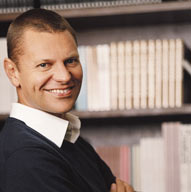
Book Publisher
When did you first realise that you had a different way of thinking?
My dyslexia was diagnosed at an early age. I had trouble with reading and writing – I’d often write letters around the wrong way. And I couldn’t spell the simplest of words, which was especially distressing to my mother, who was a book editor.
My parents cottoned on to it early. I went through things such as remedial lessons to try and overcome some of these difficulties, but it really wasn’t until I was 14 that I really overcame it. My parents had decided to take the whole family on an 8-month camper van journey across America then Europe. I was away from TV, sports teams and friends. That, along with the long drives, led me to books. The lack of distractions gave me the capacity to concentrate on a book, and at 14, I read my first full length book, a Hardy Boys novel.
What was your experience of school?
I didn’t enjoy it to be honest. I wasn’t an unhappy kid at school but I did relatively poorly. Eventually I scraped through and left at the end of the sixth form. I just found it difficult to concentrate in class and was glad to leave school.
How did you get involved in publishing and photography?
My parents were book publishers, and I started in the company, Moa Publishers, as the ’apprentice lad’. I did a bit of everything; I was junior salesman, warehouse lad and boy about the office. It was real ground up learning and I got to experience all facets of the publishing business.
A decade or so later I saw a photographic book that was compiled by Edward Steichen in the 1950s called The Family of Man. It was an extraordinary portrait of humanity and its relationships and it inspired M.I.L.K. (a collection of photographs which has been exhibited in various international venues around the world and the books have sold more than three million copies). The M.I.L.K project enabled me to launch my own publishing company PQ Blackwell, which publishes 15-20 books a year which sell in approximately 30 countries around the world.
What are the main work challenges that you have had to overcome?
Reading out loud in public was always a problem in school, and even today, when I give a speech, I’m fine if I’m not doing it from notes. Trying to do it from notes remains a big issue for me.
What do you think are some of the positives and negatives of dyslexia?
I tend to imagine and see things quite visually. I can visualise projects in fine detail before they exist and fresh ideas seem never to be in short supply. Practical details tend to stimulate me a good deal less.
What advice would you give young New Zealanders who are dyslexic?
View it as a positive, rather than as a negative. Dyslexics often have a different way of looking at things, and that difference can sometimes lead to interesting results. Have confidence in your own ability and find what it is you should be doing to make the most of your unique talent.
Click here to return.
